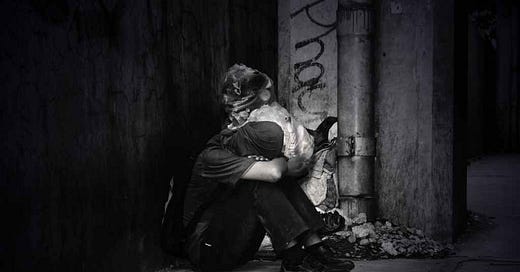Can you imagine being 16, and living on the streets? / A.J. Hendry
This week I've been preparing for several different kōrero I'll be giving within the next week about the issue of Youth Homelessness.
I've been doing this for a while now, but whenever I reflect on the reality of Youth Homelessness I struggle to believe this can be something we're actually allowing in this country.
Because, to be absolutely honest, the reality is fairly unbelievable.
Over half the homeless population are rangatahi, and yet knowing this, there are very few Government funded services and supports to care for our homeless rangatahi, meaning they continue to be traumatized, abused and neglected.
But, it's not like the Government isn't investing in supporting homeless whānau, it's that they are doing so at the exclusion of our young people.
In this country, if you are an adult, or a whānau, there is more support available for you than if you're a 16 year old facing living on the street tonight.
In fact, if - as a 16 or 17 year old - you walk into work and income today seeking emergency accomodation, there is a high likelihood you'll be turned away to live on the street.
Yet, if you are lucky enough to be granted Emergency Accommodation, and be placed in a motel, there is no guarantee you will be safe. It's very likely you'll be housed in a motel filled with vulnerable and unwell whānau, in an environment where you will be a target for abuse and exploitation.
But, winz is not the only system that is contributing to our young people experiencing homelessness. I know young people that have been homeless while in care, only to be discharged into housing instability. I know young men who have been literally kicked out of prison onto the street.
Our young people are suffering.
We are creating the next generation of chronic rough sleepers.
It does not seem real.
The issue of youth homelessness is complex, and the harm that is being done to our people is immense. That's why Manaaki Rangatahi (the youth homelessness collective) has been calling on the government to implement a national strategy to respond to this injustice.
This strategy would map out the pipelines that are funneling our young people into homelessness (pipelines like poverty, mental health and aod services, the school, justice, care and welfare systems) and seek to address them by responding with the appropriate interventions. We're also calling for legislation to be implemented that would not allow any government agency, or service funded by the government, to release a young person into homelessness.
Alongside this, we need to see investment in our rangatahi. The government continues to build more social housing, which is great, but home much of this is allocated to serve our young people.
Very, very, little.
We're seeking investment in our young people.
Our collective represents some of the key players in the Youth Housing and Homelessness space in Tamaki and several solutions have been proposed, from immediate accommodation facilities, to tiny homes, to more intensive services. We've put these on the table to government, they're ready to go, but we haven't received the investment to get them going. To put this in perspective, adult homelessness services are growing rapidly and are receiving intensive investment, if we could just get a quarter of their budget we could start making a difference.
But, this isn't just on the government. Homelessness begins in our communities, and we as communities have a responsibility to do what we can to prevent and end it.
Right now, our movement needs advocacy and support. We need people to write to their mps, to petition government, to make this an issue for our elected officials. Politicians need to know that New Zealanders aren't willing to accept this any longer.
But, besides from advocacy, there is also some thinking to be done around how communities can respond to youth homelessness in their midst. My own community in Massey is about to begin trialing a host home program (The Safety Net) to leverage our spare rooms in order to house young people in need of emergency accomodation and prevent them from going into motels, or ending up on the street. Vision West are beginning an exciting tiny home project (My Whare) which is contingent on community support, and whanau willing to allow a young person into their homes.
And at the most basic level, you can sign and share our petition below, get your friends, community, and church behind it, and help us highlight to the government that nz wants to see change happen in this space.
The injustice of Youth Homelessness must not be allowed to continue for even one more generation. We can end this, and we will, if we as a people rise up and decide enough is enough.
We refuse to accept this any more.
Sign our petition here and join the movement.
#EndYouthHomelessness
A.J. Hendry is a Laidlaw College graduate, and now a Youth Development Worker and housing advocate, working in the Youth Housing and Homelessness space. He leads a service supporting rangatahi experiencing homelessness and is also a steering group member of Manaaki Rangatahi, a collective working to end youth homelessness in Aotearoa. He is also the curator and creator of When Lambs Are Silent.




